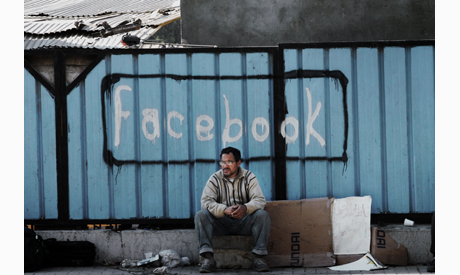
Photo by Bassem Samir - part of a collective exhibition entitled “To Egypt with Love” at Safarkhan gallery in Zamalek.
There is a famous line spoken by Mark Zuckerberg, the founder of Facebook, in the award-winning movie The Social Network, “We don’t know what it can be. We don’t know what it will be.”
The question of what Facebook can be has been settled by Egyptians, becoming an unprecedented form of expression and a catalyst to activism. If the Egyptians manage to bring democracy to their country, we don’t know what Facebook will be.
The Social Network follows the life of Mark Zuckerberg, the world’s youngest billionaire, during the time Facebook was created. The movie is of a new generation whose social realm has extended beyond the physical onto the internet. The film, written by Aaron Sorkin and directed by David Fincher, won the Oscar for Best Adapted Screenplay, amongst other awards.
The ingenuity of Facebook may not have been intentional. The makers of the film realised that the story isn’t about the website, but about the real world from which the site was derived. Since society’s needs are reflected in the more liberal, virtual world, The Social Network can be remade a thousand times over for every society and still be meaningful.
If the movie is anything to go by, the intent of Facebook never differed from how it’s being used today. It was aimed at connecting people and transferring certain interests from society on to the virtual world.
The Social Network’s Mark Zuckerberg tries to compensate for social ineptitude by transferring societal interactions to a world where he is freer and more capable. Likewise in Egypt, the political ineptitude of the government forced politics into a virtual world.
That’s not to say that The Social Network’s Facebook is the same as Egypt’s, there’s a stark contrast between the two. They may relate to one another in function, but not in actualisation.
Egypt’s Facebook started out pretty much like Fincher’s. It was a medium by which to meet old friends, find new ones and organise events and parties. The shift from using aliases to real identities invited a stream of real information to flow into Facebook.
But the real world in Egypt was different to that of America’s. Egypt’s real problems extended beyond the ‘relationship status’. Repression made it difficult to have meaningful social or political interactions in real life. There was more freedom in a status update than there was on the street. More than that, there was someone to listen, understand, relate, comment and even like. Scanning Egypt’s Facebook reveals a new printing house of sorts used to communicate, coordinate and spread new ideas.
In light of false media, the truth finds its way through the cracks of the virtual world. With more efforts from the Egyptian government to depoliticise the streets, Facebook got politicised.
In their frustration, Egyptians fill their pages with videos, pictures and news articles overflowing with experienced injustice, not knowing what use the dissemination of this information would be. A nationwide strike in April of 2008 was triggered almost solely on Facebook. The cold-blooded murder of Khaled Said by the police filled Egypt’s Facebook with news and links; Egypt’s youth with frustration and anger.
Egypt’s Facebook harboured and incubated so much dissent, and by the time of the revolution, various forms of media and opinions on church bombings, train shootings and rigged elections were overflowing. It may have been on Friday 28 January 2011 when the government shutdown the internet and Facebook that Egypt’s Facebook had no choice but to finally burst into the real world.
Today, Egyptian streets have an established marital bond with Facebook. The Armed Forces have set up an official Facebook page to issue their communiqués and Egyptians continue to express themselves through notes, media and links on Facebook.
In a way, we’ve come full circle; The Social Network’s Facebook took the realm of social interactions to the web and in return Egypt has taken Facebook beyond those pages into the world.
On a final note, Facebook did not revolutionise Egypt, if anything, Egypt revolutionised Facebook
Short link: